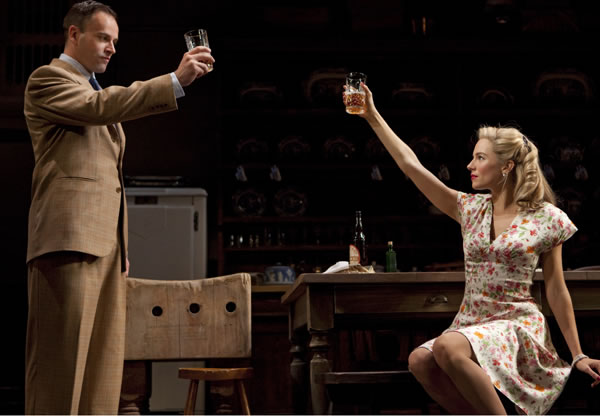BY SCOTT HARRAH
THEATER REVIEW: AFTER MISS JULIE
Written by Patrick Marber
Directed by Mark Brokaw
Through December 6
At the American Airlines Theatre
227 West 42nd Street
212-719-1300; roundabouttheatre.org
Patrick Marber’s adaptation of August Strindberg’s 1888 classic “Miss Julie” uses two twists to modernize the story: moving the action from 19th century Sweden to Britain in 1945 on the eve of the Labour Party taking over parliament, and the star power of Sienna Miller. Strindberg’s plays are often loaded with literary mothballs, but playwright Marber (author of the screenplays for the Oscar-nominated “Closer” and “Notes on a Scandal”) updates the story to make it relevant enough to intrigue modern audiences.
Sienna Miller may be the box-office draw here as spoiled upper-class vixen Julie, but her co-stars Jonny Lee Miller, as estate worker John, and New York stage veteran Marin Ireland as the cook and John’s fiancé, Christine, give much more credible performances.
Sienna Miller looks the part of a sexually frustrated temptress, with her long legs, blonde hair and lithe body, but she has neither the stage presence nor the acting chops to match Mr. Miller and Ireland. When she first enters the stage in a flowered dress, she oozes sensuality, and her voice and mannerisms have the requisite haughty air of a woman of privilege. Unfortunately, as the story progresses, Miss Miller’s performance is uneven compared to that of her male co-star, and her melodramatic handling of dialogue diminishes their chemistry.
Jonny Lee Miller adds the right amount of working-class angst and sexual tension to the role of John, a World War II veteran who wants more out of life than serving his wealthy, aristocratic employer, Julie’s father. Mr. Miller, with his movie-star handsome looks and effusive masculinity, is completely believable as a man who literally charms the knickers off the two women fighting for him. His tirades against Julie’s sexual machinations are always top-notch. He’s a man that has difficulty coming to terms with his role in the crumbling British class system, and Mr. Miller brilliantly delivers Marber’s crisp lines in rapid-fire bursts of passion and disgust.
Marin Ireland, as frumpy Christine, has an unrewarding role, but she does everything to make the character stand out. Ireland delivers a wide range of emotions, from her innocent gullibility about John’s actions to her docile domesticity. It’s difficult for most American actors to speak in a believable British accent, and Ireland sometimes struggles with the dialect, but one overlooks this minor flaw because, in crucial scenes, her face and quivering, nervous voice convey a gamut of feelings, from piety to anger and mental anguish.
This story of a love triangle gone horribly awry is often riveting, but dated like so many Scandinavian classics. However, playwright Marber does a fine job of transferring Strindberg’s take on 19th century aristocracy to 1945 England, but it’s disappointing that director Mark Brokaw is unable to get Sienna Miller to perform at the same first-class level as the rest of the cast.






































